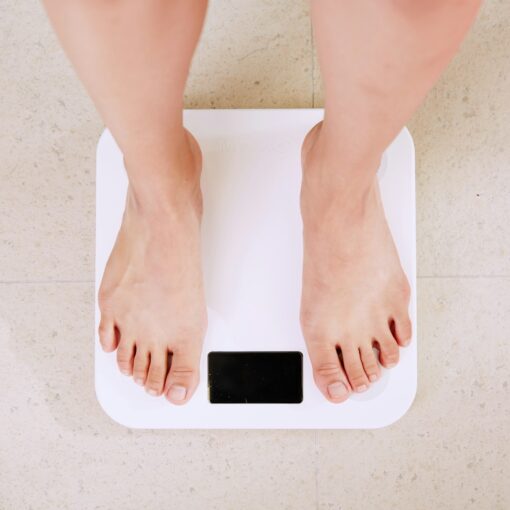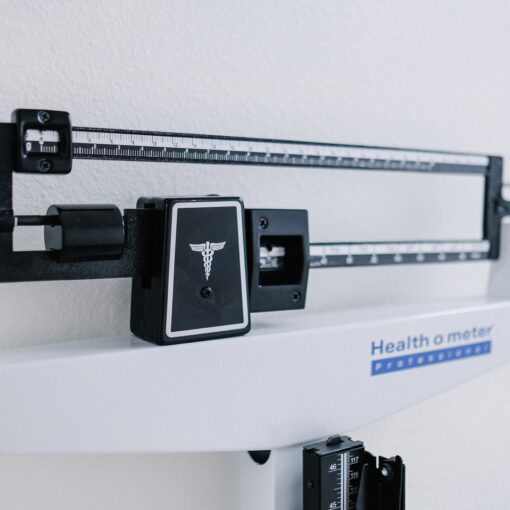Page Menu
Most people want to look their best, with and without clothes on. Although societal influences can skew our perception of the ideal figure, it’s also human nature to want to find our personal best, and figure out how to get there.
Key Concepts and Top Takeaways
– Focus on sustainable changes rather than quick fixes for weight loss.
– Don’t skip meals; eat regular, balanced meals to maintain energy.
– Incorporate strength training to build muscle and boost metabolism.
– Stay hydrated; drink plenty of water throughout the day.
– Avoid fad diets that promise rapid weight loss without evidence.
– Track your food intake to identify patterns and make adjustments.
– Prioritize whole foods over processed options for better nutrition.
– Set realistic goals; aim for gradual weight loss of 1-2 pounds per week.
– Get enough sleep, as lack of rest can hinder weight loss efforts.
– Consult a healthcare professional before starting any new diet or exercise program.
Please Note: This post may contain affiliate links. If you click one of them, we may receive a commission at no extra cost to you. As an Amazon Associate, I earn from qualifying purchases.

It cannot be denied—the primary way to get into better shape, health and condition is through proper nutrition and proper exercise. Unfortunately, there is such a wealth of information—often contradictory, that it is sometimes difficult to figure out how to make a plan that works.
It is important to maintain good condition for your body and mind. The primary way to get into better shape, health and condition is through proper nutrition and proper exercise. One needs to provide your body with the fuel it needs, such as fruits and vegetables. You also should not consume too many calories or any high-sugar snacks that will just be stored off in fat cells. Exercise is essential to maintaining a healthy body.
Many people think that the primary way to get into better shape, health and condition is through proper nutrition and proper exercise. However, it is important to also consider mental health. There are many people who have a difficult time losing weight or maintaining a healthy weight because of depression or anxiety. The question of how to be healthier should address all the factors, not just what we eat and do in a gym.
The first step is to look at what doesn’t work. This article looks at ten myths about nutrition, dieting and exercise that can trip up even those with the best intentions.
The Myth That Diets Work for Long Term Weight Loss
The weight loss industry is a multi-billion-dollar business, and dieting is the most popular way to lose weight. We’ve been told that diets work for long term weight loss and will make us healthier and happier. But the truth is, diets do not work for long term weight loss. They can lead to depression and anxiety in dieters, and even death in some cases.
Many people believe diets work for long term weight loss. However, the truth is that most dieters regain the weight they lost and then some. Dieting usually leaves people feeling deprived and hungry, which can lead to binge-eating. It becomes harder to control cravings when you are eating fewer calories than your body needs. The best way to lose weight in the long run is by adopting healthy habits like drinking more water and getting enough sleep.
This might even have a chance of being true, but human behavior makes it pretty impossible. When people diet, they are typically changing their eating pattern temporarily. Once they reach their goal (or give in to their carb craving), they usually return to their previous eating pattern. When they do that, the weight creeps back. Lifestyle changes, which include long-term changes in nutrition habits, can lead to long-term weight loss. Semantics? Not really. When was the last time you said you were on a lifetime diet that included eating three servings of cabbage soup a day?
Skipping Meals Helps You Lose Weight
 Many people are on the quest for the perfect diet. They want to know what type of food they should eat, how many calories they should consume, and when their meal should be consumed. There is an idea that skipping meals throughout the day can help you lose weight, but is it true?
Many people are on the quest for the perfect diet. They want to know what type of food they should eat, how many calories they should consume, and when their meal should be consumed. There is an idea that skipping meals throughout the day can help you lose weight, but is it true?
Millions of people around the world skip their first meal or other meals throughout the day to help them lose weight. Is this practice safe and effective? Well, it might be, but it depends on how often you do it and what you eat during your skipped meals. Skipping breakfast is the most common form of intermittent fasting. One such example is the 16:8 diet, which involves skipping breakfast and limiting yourself to eating for 8 hours a day.
Many people who want to lose weight in a healthy way will often skip meals in an effort to restrict calories and achieve their desired figure.
Unfortunately, skipping meals is not the best way to lose weight. Not only can it lead to feelings of general weakness and fatigue, but it also deprives your body of the fuel it needs to function properly.
Not only does it make you hungry and cranky, but also skipping a meal does not help with weight loss. When you fast, your body is not getting the nutrients it needs to function. Then, the next time you do eat, you tend to overeat because you’ve felt so deprived. In addition, when your body does not get food on a regular basis, it can go into “starvation mode,” and hold onto fat calories and use calories from lean tissue instead. So, you end up keeping your fat calories and losing the muscle tissue that would help burn fat.
The Myth That Brown Grains Are the Same as Whole Grains
 The whole grain and brown grain debate is a longstanding one, with many people believing that because brown grains have been processed to extract the outer layer of bran and germ, it lacks nutritious value. But is this true? As long as the kernel stays intact, then the nutrients remain inside to provide all-round nutritional benefits.
The whole grain and brown grain debate is a longstanding one, with many people believing that because brown grains have been processed to extract the outer layer of bran and germ, it lacks nutritious value. But is this true? As long as the kernel stays intact, then the nutrients remain inside to provide all-round nutritional benefits.
There is a popular misconception that brown grains are the same as whole grains. For years, this misinformation has been propagated by food marketers who want to sell their products. The reality is that the grain's color doesn't reflect its nutritional content. The milling process strips away vitamins and minerals in order to make flour–brown flour can be made with white flour. Whole grains, on the other hand, contain more fiber, protein, and nutrients because they haven't been stripped.
Additives and dyes can make food appear to be brown, but they do not always have the same benefits as whole grains. Whole grains use all the edible parts of the grain, and contain vitamins, minerals and fiber; a combination which may reduce heart disease and some types of cancer. In addition, some whole grains, such as popcorn and oatmeal, may not be brown at all. Be sure to check the labels—look for the words “whole grain” to be listed first on the list of ingredients.
The Myth That Low Fat Foods Mean Lower Calories
 A new study showed that people who ate low fat foods actually consumed more calories than those who ate the same amount of high fat foods. The study, published in the American Journal of Clinical Nutrition, found that participants who followed a diet with less than 30% of calories coming from fat, had higher body weights.
A new study showed that people who ate low fat foods actually consumed more calories than those who ate the same amount of high fat foods. The study, published in the American Journal of Clinical Nutrition, found that participants who followed a diet with less than 30% of calories coming from fat, had higher body weights.
The participants who were on diets with less than 30% of their calories coming from fat had an average weight increase of five pounds over one year.
Low-fat food may seem like a healthier choice, but in reality, it can be quite deceiving. Foods that are labeled “low fat” usually contain sugar and carbohydrates in order to make up for the lack of fat; these two ingredients will end up adding hundreds of calories to your diet without giving you any added benefits. Pretzels, which are advertised as low fat, have over 200 calories for just one ounce.
In order for food to be considered low fat, it must have must meet the FDA requirements of having 3 grams or fewer of fat per serving, or no more than 30% of total calories from fat. But sometimes, the difference between the regular and low-fat foods are not so great in terms of number of calories saved. Take Oreos, for example. A serving of regular Oreos contains 160 calories and 7 grams of fat. A reduced fat serving contains less fat, at 4.5 grams, but only 10 calories less. What’s more, when people chow away at low fat foods, believing they can eat to their heart’s content, they can actually end up overeating and perhaps taking in more calories than if they had a reasonable, more satisfying serving of the regular food.
The Myth That Eating at Night Makes You Gain Weight
 We all know the common myth that if you eat late at night, you will gain weight. However, is this really true? Recent research has shown that people who eat their largest meal at night are more likely to be thinner than those who eat most of their calories earlier in the day. It turns out that eating more food earlier in the day is not always better for your waistline.
We all know the common myth that if you eat late at night, you will gain weight. However, is this really true? Recent research has shown that people who eat their largest meal at night are more likely to be thinner than those who eat most of their calories earlier in the day. It turns out that eating more food earlier in the day is not always better for your waistline.
Eating a large dinner at night is a myth that has been around for decades, but really does it make a difference? According to the National Weight Control Registry, people who have lost weight and kept it off have eaten dinner after 5 p.m. on average two days a week. This experiment was designed to help identify any special factors that might be associated with keeping weight off over time.
The idea that eating at night makes you gain weight is a myth. Studies have shown that no matter what time of day you eat, your body will burn the calories off at the same rate. If the person eats more calories than they need from an evening snack, they will store it as fat just as if they ate it in the morning or afternoon.
When you eat is not as critical as what you eat. If you are eating the proper number of calories each day, eating at night does not cause you to gain weight. What does sometimes happen is that in the evening, when we’re sitting in front of the TV, we may end up mindlessly munching and consume more calories than planned.
The Myth That You Can Spot Reduce Your Weight from Time to Time
It is a common misconception that you can spot reduce your weight. This notion has grown out of the idea that there are different “zones” of fat on the body, and that by exercising or dieting in specific areas, you will see more change than other areas. It is true that if you gain weight in one area, such as your stomach, it will be easier to lose fat from this area than another region.
Many think that an occasional workout will help them to spot reduce weight. This myth is not true, in order to lose weight, you need to work out on a regular basis. There are plenty of benefits of working out, it helps you to stay healthy, provides both physical and emotional benefits, has many other health benefits that the body needs. The human body is in need of movement in order to function properly.
It would be great if we could follow a specific diet or exercise that would immediately target our most troublesome spot. For many men and women, the abdominal area is high on the list of places to shape up first. Some advertisements hawk products that will turn your belly into a six-pack, or give you washboard abs. However, the fact remains that it is not possible to lose weight in one specific area. What can happen is this: as you lose overall weight, the underlying muscles become more prominent. As you tone those muscles, you will begin to notice more definition.
Ladies Fear That Weight Lifting Bulks Women Up
 Ladies often avoid weight-lifting at the gym, because they believe that it will bulk them up and make them resemble a man. This is actually a misconception. Women who want to build muscle should focus on exercising their upper body and becoming stronger by completing moves such as push-ups, chin-ups or lunges. The goal is not to become bulky, but to increase the number of calories burned during exercise and improve overall health.
Ladies often avoid weight-lifting at the gym, because they believe that it will bulk them up and make them resemble a man. This is actually a misconception. Women who want to build muscle should focus on exercising their upper body and becoming stronger by completing moves such as push-ups, chin-ups or lunges. The goal is not to become bulky, but to increase the number of calories burned during exercise and improve overall health.
Ladies fear that weight training will bulk them up and feel anxious about joining a gym. In the last decade, the number of women weightlifters has increased by 20%. There are more resources available for women who wish to start a weightlifting routine. Most importantly, the effects of exercise differ based on a person's genetics and hormones. Women can still have a lean appearance while building muscle mass.
This has been a fear that has kept many women from exploring the benefits of weight lifting. Studies have repeatedly shown that because of their muscular structure, it is much more difficult for women to turn into the Incredible Hulk by lifting weights. Sure, there are women bodybuilders who have turned their bodies into ripped divas, however, this doesn’t happen by accident. The average Jane in the gym can very safely lift weights for tone and definition without worrying about turning green. An added plus—strength training helps fight osteoporosis.
The No Gain Equals No Pain Myth to Weight Loss and Exercise
 In the world of fitness, every little detail is analyzed and studied. What type of shoes do you wear? The type of footwear can have a significant impact on your feet, ankles, calves and knees. How many reps should I do? If you want to be more efficient with your workout time, you should be doing around 10-12 reps. What types of food should I eat? Do you want to lose weight or gain muscle?
In the world of fitness, every little detail is analyzed and studied. What type of shoes do you wear? The type of footwear can have a significant impact on your feet, ankles, calves and knees. How many reps should I do? If you want to be more efficient with your workout time, you should be doing around 10-12 reps. What types of food should I eat? Do you want to lose weight or gain muscle?
For many, losing weight and exercising can seem like a hard task. It takes time, planning, and patience to find the right balance between what you eat and how much activity your body needs. For some people, this may also involve cutting back on the number of calories they consume. But for others, it's not so easy.
One of the biggest reasons why many people don't exercise or eat healthily is because they don't see any improvement from their efforts. In other words, if there is no reward for doing something, then people will stop doing it. This is not always the case with weight loss and exercising. When a person learns to work hard without seeing results, they will start to feel a sense of accomplishment and pride that comes with the hard work.
If we lift weights today and still can walk around comfortably tomorrow, we didn’t do a good job. If we’re not gasping for breath on the elliptical machine, we’re certainly not pushing hard enough. That’s the belief that stops so many potential exercisers from trying to exercise—the idea that you must suffer. Exercise should be fun, experts agree. While professional athletes may have different physical fitness needs, for most people, exercise should be something you can enjoy doing and can do on a regular basis. If, for example, you despise running, then you can walk the same amount of distance at a brisk enough pace, and still have a chance to check out the scenery.
The Myth That Your Muscle Turns to Fat When You Stop Exercising
 In recent years, it has been popularized that when people stop exercising, their muscles will turn to fat. This is not the case. The process of converting muscle to fat is a slow and complicated process in which fat cells in the body release enzymes called lipases, which in turn break down the muscle’s protein tissue. The muscle does not convert directly into fat.
In recent years, it has been popularized that when people stop exercising, their muscles will turn to fat. This is not the case. The process of converting muscle to fat is a slow and complicated process in which fat cells in the body release enzymes called lipases, which in turn break down the muscle’s protein tissue. The muscle does not convert directly into fat.
Exercise is not just about burning calories. It is also about building muscle that will burn more calories at rest. Scientists are discovering the importance of maintaining lean body mass to stay healthy and avoid chronic diseases.
After long periods of inactivity, muscles can turn to fat, but research is proving that bone density, adverse metabolic effects, cardiovascular risks, and adverse changes in blood pressure are all impacted by decreased muscle mass.
Muscles are muscles, and fat is fat, and never the ‘twain shall meet, sort of. Actually, muscles and tissues are made of two different types of tissues, and one cannot turn into another. Muscles can grow through exercise or shrink with disuse, and fat cells can increase or decrease, but they do not change their composition. Think of an empty cup. When you pour water into the cup, there is less room for the air that was in the cup, but you are not turning the air into water.
The Myth That It Is Best to Exercise on an Empty Stomach
The belief that exercising on an empty stomach is best for weight loss has been around for decades, but is it really true? As it turns out, studies show that the timing of your workouts and when you eat in relation to exercise does not affect weight loss. When we exercise, we use glycogen (the sugar found in our muscles and liver) and store fat. This process is unaffected by when we eat before or during a workout.
The fitness industry has been telling people for years that it is best to exercise on an empty stomach. The logic was that the body would be less focused on digesting food and more focused on burning calories from working out. This is not true though, as recent studies have shown that it does not matter when a person eats before they exercise. What matters is what a person eats.
Many of us have heard our parents or friends say that it is best to work out on an empty stomach because the body is able to use any food for energy rather than store it as fat. This is not true. When carbohydrates are burned for fuel, they are stored in the liver, muscle, and blood-stream until they are needed for later use.
Who would have thought that you’d need to eat in order to exercise? When you start to burn calories through aerobic exercise, your body first goes for fuel in the form of calories in recently eaten fats and carbs. If you haven’t eaten recently, then there may not be enough carbs to use as fuel, so your body goes to the next source: muscle. So instead of exercising on an empty stomach, eat a light healthy snack instead before you exercise.
Dispelling Two Myths About Weight Loss
Weight loss is the objective of tens of millions of Americans. Yet, only a small percentage of fat people seem able to lose the weight and permanently keep it off. Why is this? We are always hearing about the diets that people are on, and the workouts that they are doing. How come people are not losing weight as rapidly, or even with consistent success, as they should be?
Well, the answer is that too many people don’t know the proper techniques for losing weight permanently. They have been sold on fad diets, and on workout regimens that most of them are not fit enough or strong-willed enough to sustain.
There are much smarter ways of approaching weight loss. The smart ways work, and they are sustainable. They are also easier to implement in your life than you likely think.
Food Is Not for Comfort
 Alright, we all have our comfort foods. Well, most of us do. But the fact is that food is not for comforting. It’s not for stress relief. While it should taste great, food is for energy and the sustaining of health. Period. When you feel hungry, your body is simply telling you that it is in need of an energy boost. It’s not in need of relief from emotional stress, except for the emotional stress of needing energy.
Alright, we all have our comfort foods. Well, most of us do. But the fact is that food is not for comforting. It’s not for stress relief. While it should taste great, food is for energy and the sustaining of health. Period. When you feel hungry, your body is simply telling you that it is in need of an energy boost. It’s not in need of relief from emotional stress, except for the emotional stress of needing energy.
If you eat comfort food, it should be eaten as fuel for the body, in addition to comfort. So, how can you better handle stress without the need to eat (which leads to overeating and frustration with weight loss)? What about listening to music? What about dancing to that music? If you play a musical instrument, you could play something for yourself for relief. You could read some chapters in a great book, or read some poetry. Even more than reading, you could write out your thoughts and feelings in a journal, or do a drawing. You could play a mentally challenging video game, including possibly electronic chess, on your computer. Walking is one of the greatest stress relievers.
Exercise Is Not Punishment
Exercise is not punishment, but a necessary component of healthy living. Exercise has been shown to reduce the risk factors for numerous illnesses and conditions, including cardiovascular disease, diabetes, depression, and cancer. Even for those with chronic illness or disability, exercise can be a powerful tool to lower stress levels and improve quality of life.
Exercise is not punishment. It’s a reward! At the end of the day, how many people truly look forward to their exercise routine? When we work out, we feel accomplished, physically and mentally. Exercise allows us to physically release any pent-up stress that we may have had throughout the day. Exercise also boosts our mood by releasing those feel-good chemicals in our brain, such as serotonin and dopamine.
Exercise is not a punishment, it's an investment. The benefits of exercise are endless. It can help people live longer, feel better about themselves, and decreases the risk of cardiovascular disease, obesity, diabetes, and cancer. Exercise is not just for athletes either; even if you're overweight or struggling to maintain normal fitness levels due to age or illness, there are many safe exercises that can be performed at your own pace that will bring these benefits into your life!
You cannot punish your body and expect to sustain an exercise regimen. A “workout” should actually be a “pleasure outing” for you. It’s not a punishment for having committed the sin of eating something with sugar in it. This is no “mea culpa” whipping. Exercise is great, and you should be looking forward to it.
Exercise is necessary for significant weight loss. It can be done as a replacement for comfort eating as a relief from stress, but it should never be done as self-punishment for eating.
Focus your mind on how much better you’ll sleep, how much more self-confident you’ll feel, how much more energy you’ll have, and how much less stress you’ll have from exercising. You can also focus on the adventure you’ll have. Don’t focus on the weight loss aspect of exercise. And yet, you can know that your exercise efforts will indeed help you lose weight permanently.
So, there you have it. Two myths dispelled. Two obstacles to your permanent weight loss overcome.
Wouldn’t it be a wonderful thought to be able to get back into the jeans you wore in high school without having to go on a strenuous diet that only leaves you hungry. A vast majority of the diets today do not work, and the truth needs to be told. Low fat, low-carb, low calorie, and low food intake diets are just a myth and studies have shown that these diets are a big waste of time. The fact is starving your body of the nutrients in certain foods can cause more harm than good, and chances are you’ll lose very few pounds in the process. Why go through that type of torture and have nothing to show for it?
The great news is there are diet programs that show you how to use your food intake to your advantage and still lose weight that stays off. I’m sure there are thousands of people who have played the roller coaster weight loss game where you lose, you gain, you lose, and then you gain. This is depressing, but there is a light at the end of the tunnel. There are proven techniques that allow you to still be able to eat good foods and lose weight at the same time by manipulating food to work for you instead of against you.
If you’re thinking about starting a diet, there are a few things you should keep in mind:
1. Before you start a diet, it would be a good idea to consult your physician just to make sure that your health is completely intact. Your doctor may have some good suggestions to help with stabilizing your metabolism.
2. Get a grocery list made up of healthy foods, especially plenty of fruits and vegetables. Try not to buy any snack foods, but if you must have them follow the suggestions you receive from your diet program.
3. Keep a pair of loose-fitting clothes nearby for the light exercises that will help with firming those problem areas. It is also good to keep a comfortable pair of shoes to walk and work out in.
4. Keep plenty of water handy to keep from becoming dehydrated, and do exercises in moderation. Never over exert yourself because it is difficult to work out with sore muscles, and you won’t keep up with the daily routine.
5. Most important: Try to make it a fun challenge and not a tedious task. Dieting and stress usually goes hand in hand, but it does not have to be that way with a comfortable program that really works.
Using these suggestions coupled with one of the best diet programs on the internet can catapult you towards obtaining the results ‘ve always desired. These fast and effective programs will help you to lose 9 pounds every 11 days and drop 8 dress sizes without using any of the traditional diets that have yielded no results.

Kevin Collier is a seasoned health writer at Otchut.com, specializing in over-the-counter medicines, common medical ailments, and general health topics. With a background in healthcare and a passion for making medical information accessible, Kevin aims to empower readers with knowledge to make informed health decisions. When he's not writing, he enjoys researching the latest in health trends and advocating for wellness in his community.





